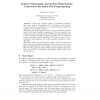Free Online Productivity Tools
i2Speak
i2Symbol
i2OCR
iTex2Img
iWeb2Print
iWeb2Shot
i2Type
iPdf2Split
iPdf2Merge
i2Bopomofo
i2Arabic
i2Style
i2Image
i2PDF
iLatex2Rtf
Sci2ools
FSTTCS
1993
Springer
1993
Springer
Induce-Statements and Induce-Expressions: Constructs for Inductive Programming
A for-loop is somewhat similar to an inductive argument. Just as the truth of a proposition P(n + 1) depends on the truth of P(n), the correctness of iteration n+1 of a for-loop depends on iteration n having been completed correctly. This paper presents the induce-construct, a new programming construct based on the form of inductive arguments. It is more expressive than the for-loop yet less expressive than the while-loop. Like the for-loop, it is always terminating. Unlike the for-loop, it allows the convenient and concise expression of many algorithms. The for-loop traverses a set of consecutive natural numbers, the induce-construct generalizes to other data types. The induce-construct is presented in two forms, one for imperative languages and one for functional languages. The expressive power of languages in which this is the only recursion construct is greater than primitive recursion, namely it is the multiply recursive functions in the rst order case and the set of functions exp...
| Added | 09 Aug 2010 |
| Updated | 09 Aug 2010 |
| Type | Conference |
| Year | 1993 |
| Where | FSTTCS |
| Authors | Theodore S. Norvell |
Comments (0)

